Red onion
Red onion – an elixir for your health
Red onion is a food rich in sulfur, quercetin and chromium. Eating red onion maintains the health of your circulatory system, heart, prevents diabetes and eliminates toxins from the body. Better tolerated by people with sensitive stomachs, red onion is a source of health and helps you in diets to lose weight.
If you like onions, you’ve probably tasted red onion too. Compared to white onion, red onion is sweeter, less spicy and contains twice the amount of antioxidants. This vegetable contains vitamins A, B and C, mineral salts, antibiotics and diuretics. The specific taste is given by sulfides, which once ingested, in turn produce in the body cysteines, substances with an important role in weight loss and detoxification.
Yellow onion and white onion are very healthy because they contain compounds of sulfur, quercetin and chromium. However, red onion is the only onion that has anthocyanins and is therefore denser in nutrients that any other variety of onion.
Nutritional values of red onion (100g)
- Calories: 23
- Protein: 0,9 g
- Potassium: 40 mg
- Calcium: 31 mg.
- Phosphorus: 32 mg.
- Vitamin C: 25 mg.
Benefits of red onion
Onion is one of the most famous and beloved vegetables in the world. While most children love the pungent taste and aroma of onion, adults have divided opinions. But red onion is really delicious in salads, dishes or preserves.
Red onion contains twice as many antioxidants as any other variety of onion, being recommended for a healthy diet and a healthy lifestyle. Red onion is famous for different group us of sulfites, including tdiallyl sulfides: DMS, DDS, DTS and DTTSt. These groups of sulfites help the production of cysteine in the body and are effective for weight loss, detoxification and cancer prevention. Scientific research has shown that sulfites have a strong antioxidant value.
Sulfer-based compounds from red onion lower LDL cholesterol and triglycerides, while raising good HDL cholesterol levels. Consumption of red onion helps improve the function of the cell membrane in red blood cells, cardiovascular function, as well as fat metabolism. Red onion is also a rich source of antioxidant quercetin and anthocyanin, polyphenols. These antioxidants prevent the oxidation of fatty acids and cells. Doctors claim that the absorption of quercetin from onion is more effective that taking quercetin extracts as a supplement. The body is able to better recognize the nutrient when it is in a natural form and has other synergistic components associated with it.
Red onion is also a fantastic source of chromium, which lowers blood sugar and limproves cellular insulin sensitivityl. Chromium deficiencies lead to diabetes and heart disease.
Antioxidant flavonoids are extremely rich in the outer layers of the onion. Many people remove the first layers of onion and will lose much of these essential nutrients. Make sure to use when cooking the outer editable portions of the red onion.
At the same time, due to its multiple properties, red onion is on the list of foods allowed during diets. Onion have an alkalizing effect on the body, it is useful for eliminating toxins from the body and is an excellent diuretic.
Contraindications and side effects of red onion
It is recommended that patients with gastritis, colitis, ulcers or irritable bowel syndrome eat raw onion with caution. Ingestion of this food can cause heartburn, hyperacidity, leading to nausea and indigestion. If you have a sensitive stomach, try small doses of red onion. Most people with stomach problems are more likely to tolerate red onion that yellow onion or white onion, also known as water onion.
How to eat red onion
If we cook onion, the heat process will damage some anthocyanins, but not quercetin. Quercetin is found in soup or borsch. The lower the temperature, the more nutrients will be contained in the food. Studies have shown that 4-7 servings of red onion each week (equivalent to about 2-3 onions) have been associated with the greatest benefit in reducing colorectal, oral, laryngeal, esophageal and ovarian cancer.
Red onion should be stored in a cool, dry area, in a ventilated space. Until consumption, onion should not be stored in the refrigerator or kept in a plastic bag, as it has been shown to accelerate deterioration. Once unwrapped or cut, it is best to keep them in the refrigerator.
Beneficial properties of red onion
- prevents cardiovascular disease;
- maintains the health of blood vessels;
- decreases the risk of tumors and cancer;
- fight against infections;
- improves lung function in asthmatics;
- helps to detoxify the body;
- lowers triglycerides;
- lowers blood pressure.
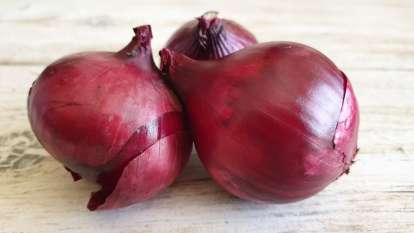
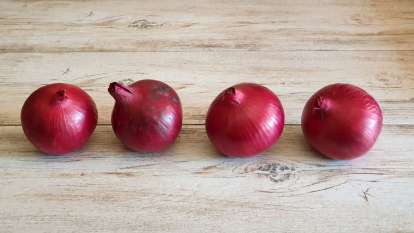
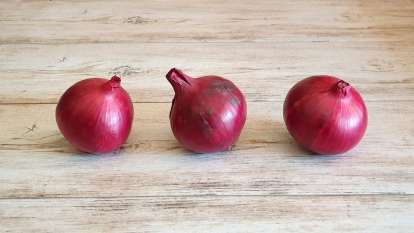
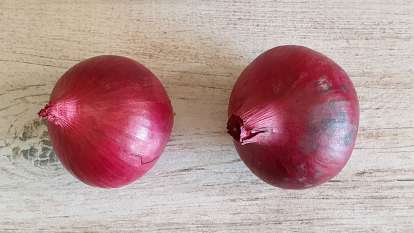
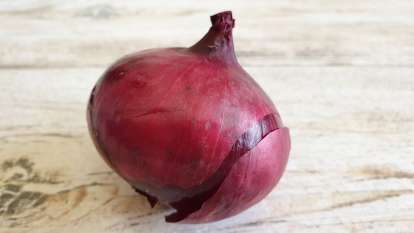
Comments